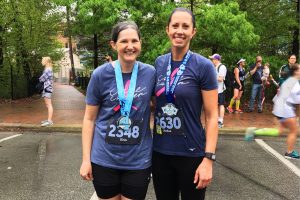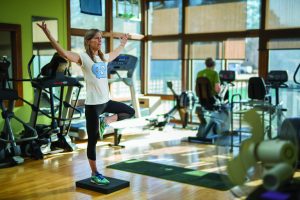
When she was diagnosed with breast cancer, Erin Juliano was an active, young mom who loved to run outdoors and do exercise classes at the gym.
While she tried to remain active during chemotherapy, surgery and radiation, she wasn’t in the same shape afterward. Surgery made it difficult for her to raise her right arm, which required physical therapy.
“I certainly wasn’t anywhere near where I was before my diagnosis,” Juliano said, in terms of her physical activity level.
On her last day of radiation, her doctor handed her paperwork for Get Real and Heel, a free exercise program for cancer survivors at the N.C. Cancer Hospital. Launched in 2006 by UNC Lineberger Comprehensive Cancer Center, the program offers a space for patients to exercise alongside expert trainers who understand what they’ve gone through.
After more than a year in the program, Juliano made fitness gains, and a research study that tracks her heart rate, muscle mass and other health indicators with high-tech equipment confirmed her progress. She gained intangible benefits as well — a community of survivors who have been a source of motivation.
“There are some women who have been participating in the program since it started, and it’s just so inspiring to see these women now thriving and back to their regular lives,” she said.
Reaching more people
UNC Lineberger researchers are working to expand Get Real and Heel. They want to find innovative ways to reach more patients who can’t physically make it to the facility and to improve outcomes for others.
“Our ultimate goal is to expand to other types of cancers, expand the facility and really help as many patients as possible,” said UNC Lineberger’s Claudio Battaglini, PhD, FACSM, Get Real and Heel’s program director and co-founder, and a professor of exercise and sport science at UNC-Chapel Hill.
Battaglini is now leading a team of experts from oncology, cardiology, psychology and immunology, as well as cognition sciences in a new study using advanced measurement tools to understand why some patients fully recover cardiopulmonary capacity — a measure of their ability to deliver oxygen — through exercise, and others don’t.
“This is really something that takes a village to conduct a study that is so complex, but it’s generating data that will teach us a tremendous amount,” Battaglini said.
In another study, UNC Lineberger’s Bill Wood, MD, associate professor in the UNC School of Medicine Division of Hematology/Oncology, is using information from wearable sensors — such as the Fitbit — along with patient-reported survey data to track physical function and inform physical activity coaching in cancer patients.
He is currently working with a group mostly comprised of bone marrow transplant patients, but he plans to develop programs for patients with other cancers, patients in active treatment and cancer survivors.
He envisions using highly tailored coaching programs and systems that can track patient progress to reach more patients outside the cancer center.
“We would like to develop a program where we are coaching around all aspects of cancer care and using sophisticated trackers to make the ‘prescriptions’ as personalized as possible. We want to connect with patients where they are, so we can scale this approach to reach as many people as possible,” Wood said.
And to improve outcomes for breast cancer patients 65 and older, Hyman B. Muss, MD, the Mary Jones Hudson Distinguished Professor in Geriatric Oncology, is leading a study looking at the impact of home-based aerobic and strength exercises on the health of people receiving chemotherapy for early-stage breast cancer.
“We want to know: what’s the right exercise recipe, and can we tailor exercise for individual patients?” Muss said. “We’re trying to learn how to best scale exercise so it’s practical and doable wherever you live.”
Honoring a passion
In addition to the new research, efforts are underway to expand and improve the Get Real and Heel facility on the edge of campus, which was originally outfitted by UNC Lineberger and the Department of Exercise and Sport Science. The campaign will raise $300,000 to renovate the facility and replace the program’s exercise equipment.
To support the effort, the Kulynych Family Foundation made a gift of $150,000, and the Canon family gave $50,000. At a tea held at the Carolina Inn, past and present Get Real and Heel participants celebrated the program’s achievements and raised $35,000 to support the purchase of a range of equipment, from weights to individual exercise machines.

“I decided that I wanted to make a contribution to Get Real and Heel to honor my passion for the place and the goodness that is in the world that can create something like that,” said Pam Timmons, a breast cancer survivor who attended the tea.
Timmons recalled when her doctor told her about the program after finishing breast cancer treatment in 2016, her first thought was: Not for me; I don’t need a cancer support group.
“I wanted to put breast cancer in my rearview mirror and pretend it never happened,” she said.
She ended up joining, and her perspective has changed. She said she’s gained a special kind of motivation from the other survivors.
“A lot of these women have suffered so much; they’re going to go through the rest of their lives with injuries their treatment caused, but they want life, and they’re positive, and they’re life-affirming,” Timmons said. “They bring this spirit of ‘I’m going to conquer this,’ and that feeds me on a deep, deep level.”
For Juliano, her treatment journey is not over, but she has returned to teaching math part-time. Recently, she went to talk to her son’s elementary school class for a program on breast cancer.
“I talked about how everybody faces things that are very hard, and we just need to keep a positive attitude and know there are always people there who can help you,” she said. “That was a moment where I was pretty much done with my treatment. It was where I could look back on it and say, ‘I got through this.’ ”
In addition to participating in Get Real and Heel, Juliano has also started running again. Recently, she ran the four-mile race as part of the Tar Heel 10-Miler, a Chapel Hill-based run that is also a fundraiser for UNC Lineberger.
She ran the race with Jordan Lee, a doctoral student in the UNC-Chapel Hill Department of Exercise and Sport Science who is coordinating the complex research study of exercise as a rehabilitation tool for breast cancer patients who are participating in Get Real and Heel.
“I’ve always wanted to run with our Get Real & Heel-ers, and Erin has had an amazing journey through the past year with us,” Lee said.
